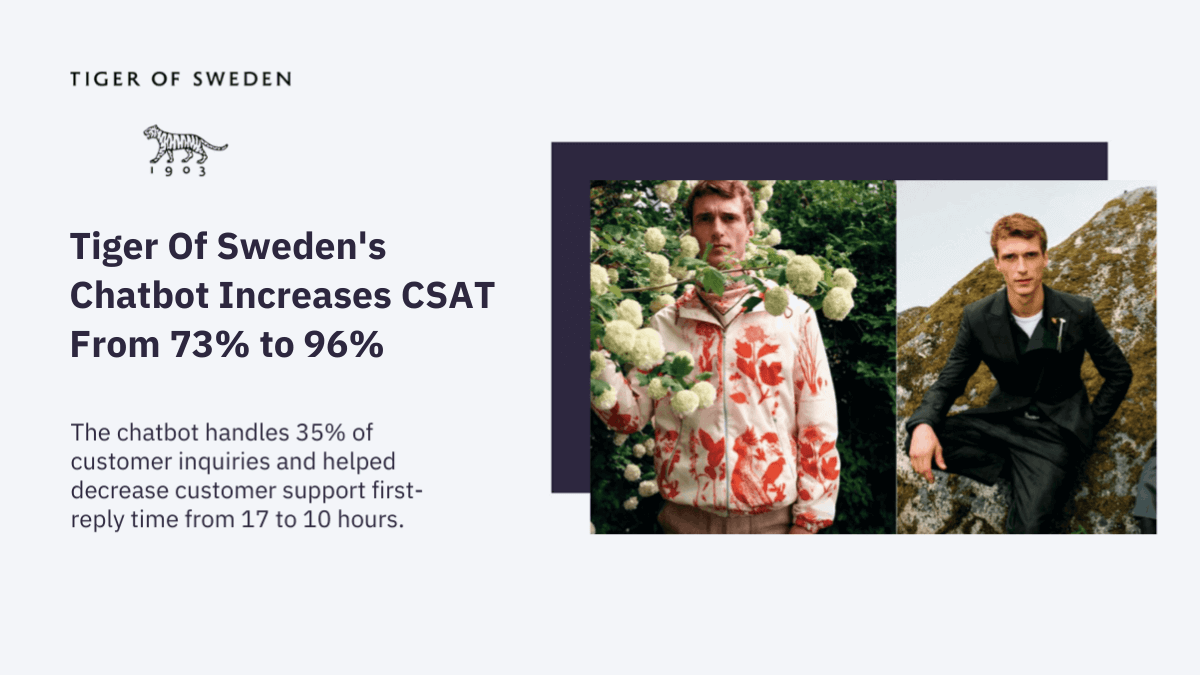Tiger of Sweden CSAT increased from 73% to 96% with an AI chatbot
- Email and phone inbounds decreased by 50%, while inbounds via chat increased by 400%.
- First-reply time for customer support agents dropped from 17 hours to just 10 hours
- 35% of Tiger of Sweden’s customer inquiries are handled by their chatbot
- Support Customer Satisfaction score has increased in just one year from 73% to 96%.
- The bot uses NLU to interpret questions from customers and provide the best answers.
- The bot was built by Tiger of Sweden’s Customer Care Manager, with no IT background.
- During a one-day, hands-on workshop, the agent learned how to build a bot on her own.
- The Bot Operator uses 1-2 hours per week on checking and updating the bot.
Who is Tiger of Sweden?
The Swedish high-end fashion brand Tiger of Sweden, founded in 1903, has become a great example of how traditional retail is embracing the digital era by expanding their services as an online, digital business.
Tiger of Sweden has several flagship stores in 8 countries and sells online to more than 30 countries worldwide. Tiger of Sweden represents a different and opposing voice to fast fashion. Historically, the fashion house has always had a focus on crafting high-quality garments while standing for fair working conditions and ethical fashion production processes.

Tiger of Sweden’s path to innovation
Catering to stylish and conscious buyers, the brand has experienced long-term growth in popularity. In their path to providing more purchase options and services online, Tiger of Sweden’s customer inquiries have been rising consistently year after year.
Questions from their customers were often very similar and responding to each individual inquiry would take up a large portion of the employees’ time in customer service, sometimes lengthening waiting time.
Innovation was needed to improve their customer support, and it would need to be fast to implement, easy to maintain, and well-integrated with their pre-existing business systems.
From problem to chatbot solution
The idea was there: to provide fast, automated and accurate answers to all similar questions that customer support was receiving. But how?
The brand started considering using a chatbot to handle all first-line support. The chatbot could be the initial gateway that would either carry out the whole conversation and resolve the ticket or pass the request on to an employee in case it was more complicated.
Tiger of Sweden chose BotXO because the platform was the best fit: it facilitated allowed and all the integrations they needed, and it was easy to use for employees outside the IT department.
The BotXO platform, while being built on state-of-the-art technology, is easy to use for non-coders.
“Across companies and across industries, we find that development teams are extremely busy. One of the priorities for us at BotXO, was to build an advanced platform that developers would love, but businesspeople too could easily use, without needing to use developers’ time” Henrik Fabrin, CEO of BotXO.

This element was surprising to say the least, so much so that the employee that was tasked with being the bot building couldn’t believe she could do it on her own. While Nadin Kempel Sigh had years of experience in the customer service area and as Customer Care Manager at Tiger of Sweden – she had zero IT background.
But I can’t code!
“I remember my first reaction when my boss told me about the project was: Do you want ME to build a chatbot?? After all, I had no experience with coding or software programming, but I just knew a lot about what customers were asking us about. So, I was a bit sceptical about it all” says Nadin Kempel Sigh.
Even so, Nadin participated in a one-day workshop with bot expert Michael Larsen, at the BotXO headquarters in Copenhagen, where she learned everything she needed to know from ideation to building and training of chatbots.

It turned out to be quite easy to get started, as the solution was modular, intuitive and did not require any coding skills. Tiger of Sweden began from a template and used out-of-the-box Natural Language Understanding with pre-made content, to have an MVP working bot -able to understand basic questions and to reply accordingly- from day one.
Building Tiger of Sweden’s chatbot – the beginning
After the workshop, Nadin gathered data on what customers asked about across the different channels and then categorized them into common themes – or as we call them in NLU/NLP, domains.

“We could see that they, for example, customers often inquired about their order status, shipping costs, and how to return items. So, we quickly set up some answers where the chatbot could respond to just those things. But unfortunately, we also made a classic beginner’s mistake” says Nadin Kempel Sigh.
Despite Michael’s recommendations to launch the bot and start editing conversation flows while the bot was live, Tiger of Sweden decided to carefully formulate as many individual questions and answers as possible, before launching. The modus operandi was based on their own knowledge and internal everyday language.
Unfortunately, the results were a product of that bias: “We had to shut down the chatbot the same day we launched it. It did not respond at all to what the users actually asked, as our own logic did not fit the users’ way of writing at all” says Nadin Kempel Sigh.
This was the first meaningful learning for the newly appointed Bot Operator Nadin. She started copying customers’ questions directly into the chatbot and then writing answers that made sense in that context, in the brand’s tone of voice. The result, this time, was very different.
Building Tiger of Sweden’s chatbot from the users’ input
Day after day as more customers were chatting with the bot, Tiger of Sweden was able to train and improve its understanding of human input and the formulations of the answers.
The more customers communicated with it, the better the chatbot got. Answers to customers’ inquiries got quicker, and the company’s customer satisfaction higher. Nadin’s editing process also improved.
“The first month I spent 80% of my time training and improving the chatbot, but today I have a routine: I look through the customer interactions every morning and then train the bot based on the feedback we have received.” explains Nadin Kempel Sigh. She now uses around 1-2 hours per week on checking and updating their bot.
Tiger of Sweden now had an AI chatbot capable of answering many customer questions, ranging from opening hours to clothing sizes and order status.

Results for Tiger of Sweden’s chatbot
Since starting to use the BotXO chatbot, Tiger of Sweden has seen an increase in overall inbounds because of the 24/7 customer service availability. At the same time, the type of inbounds changed radically: inbounds on email and phone decreased by 50%, while inbounds via chat increased by 400%.
While the inbounds via chat increased, the first-reply time for customer service employees dropped significantly from what it was before the implementation of the chatbot: from 17 hours to just 10 hours.
The chatbot works as first-line support freeing up time for their agents, who now have more time to respond faster to customers and more time to handle more complex tickets, that might require an agent to look into them. Today, 35% of Tiger of Sweden’s customer inquiries are handled by their chatbot.
Perhaps one of the most uplifting results from the chatbot implementation is that the Customer Satisfaction score has increased in just one year from 73% to 96%. Nadin Kempel Sigh stresses how the bot is playing a vital role in the improvement: “We can feel the results in the business.”
The Future for Tiger of Sweden’s chatbot
The future goals for Tiger of Sweden will be to expand the scope of their chatbot from Customer Service to becoming a Shopping Assistant. The idea is to have the chatbot help with more pre-purchase questions such as clothing size and materials.
This new role of the chatbot as a shopping assistant is expected to impact conversion rates of users shopping online, much like it did in the case of another webshop, Saxo.com, the famous online bookstore.
Authors: Beatrice Carraro
Designed by: Beatrice Carraro and Arta Vitola


